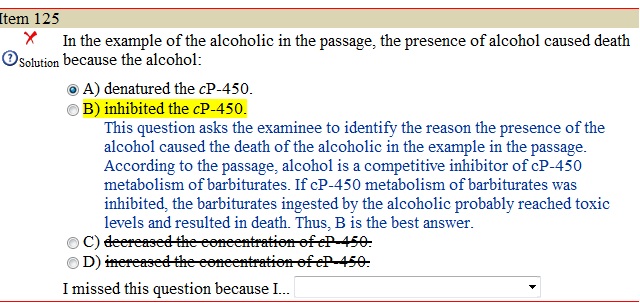- Joined
- Dec 1, 2011
- Messages
- 18,579
- Reaction score
- 57
So the passage says that cP-450 is a catalyst in the metabolism of toxins. The passage also says normally cP-450 can metabolize barbituates, but that alcohol is a competitive inhibitor of "barbituate metabolism"
As you can see, I ruled out the other two choices and was stuck between the correct answer and the answer I picked. I initially picked B, but then thought about it and came to the conclusion that the binding of a substrate to a catalyst is what gets inhibited, not the catalyst itself.
I picked denature because the passage also states that cP-450 is an Iron core with 3Nitrogens on it and I figured that the alcohol would disrupt the tertiary structure of the cP-450 by hydrogen bonding with the nitrogens.
Am I missing something here, or are the answers worded poorly?

As you can see, I ruled out the other two choices and was stuck between the correct answer and the answer I picked. I initially picked B, but then thought about it and came to the conclusion that the binding of a substrate to a catalyst is what gets inhibited, not the catalyst itself.
I picked denature because the passage also states that cP-450 is an Iron core with 3Nitrogens on it and I figured that the alcohol would disrupt the tertiary structure of the cP-450 by hydrogen bonding with the nitrogens.
Am I missing something here, or are the answers worded poorly?

